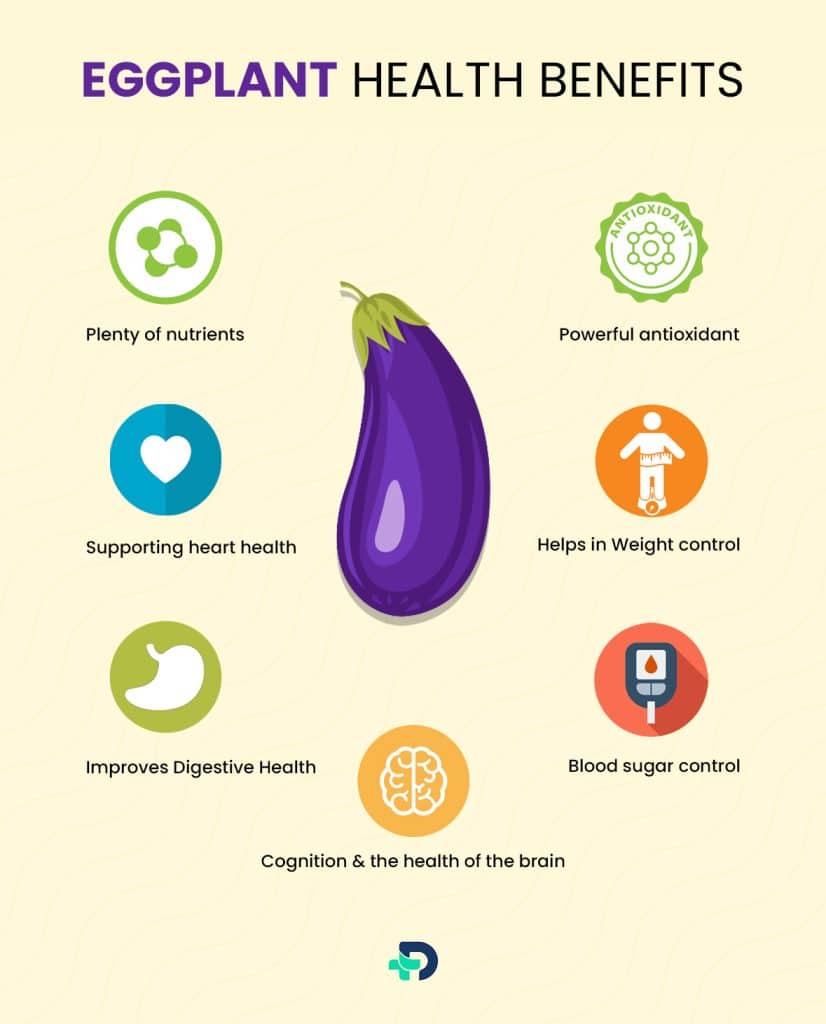Exploring the Health benefits of an Eggplant

- Eggplant
- 22 Aug 2023
Overview
About Eggplant
Eggplant is a gastronomic joy and a nutritional powerhouse, distinguished by its vivid purple color and unusual shape. This versatile vegetable has long been praised for its many health advantages because it is brimming with essential vitamins, minerals, and distinctive phytochemical components.
In this article, we explore the intriguing world of Eggplant (aubergine) and learn about its many health advantages, all of which are supported by science and make it a fantastic complement to any diet.

Nutritional profile
Nutritional profile of an Eggplant
It is a vegetable that is packed with nutrients and provides an astonishing array of vitamins, minerals, and phytonutrients. Here is the nutrition profile of a 1-cup cubed serving of cooked eggplant:
- Calories: 35
- Carbohydrates: 8.8 grams
- Fiber: 2.5 grams
- Protein: 0.8 grams
- Fat: 0.2 grams
- Vitamin C: 3.5 milligrams (6% of the daily value)
- Vitamin K: 3.5 micrograms (4% of the daily value)
- Vitamin B6: 0.1 milligrams (5% of the daily value)
- Thiamin (Vitamin B1): 0.1 milligrams (4% of the daily value)
- Niacin (Vitamin B3): 0.5 milligrams (3% of the daily value)
- Folate: 17 micrograms (4% of the daily value)
- Potassium: 188 milligrams (5% of the daily value)
- Manganese: 0.2 milligrams (9% of the daily value)
- Magnesium: 11 milligrams (3% of the daily value)
- Copper: 0.1 milligrams (6% of the daily value)
It also contains trace levels of calcium, iron, phosphorus, zinc, and vitamin A, in addition to the minerals above.5Nutrition| Researched based study from Usda.gov
One of its most noticeable characteristics is how much fiber it contains. It also contains many antioxidants, including as anthocyanin, which gives it its purple color. It has a naturally low caloric and fat content.
Health Benefits

Eggplant Health benefits
- Rich in nutrients
- Provides goodness of Antioxidants
- Supports heart health
- Helps in Weight management
- Promotes Digestive Health
- Improves Brain health and cognitive function
- Helps in Blood sugar regulation
A vegetable with a high nutritional profile, eggplant, also known as aubergine, has been recognized for improving general well-being. Some of the key benefits are as follows:
Plenty of nutrients
- It is a vegetable that is packed with nutrients, low in calories, and full of important vitamins and minerals.
- It contains minerals like potassium, manganese, copper, and vitamins like vitamin C, K, B6, thiamin, and niacin, all essential for sustaining healthy biological functions.1Health benefits| Researched based study from Nlm.nih.gov
Powerful antioxidant
- Antioxidants like anthocyanin, chlorogenic acid, and nasunin are abundant in it. These can aid in defending cells against harm brought on by radicals, unstable chemicals that speed up aging, and chronic disease development.
- The antioxidants in eggplant have been associated with lowering the incidence of several malignancies, reducing inflammation, and defending against diseases related to oxidative stress.1Health benefits| Researched based study from Nlm.nih.gov
Supporting heart health
- It has antioxidants, fiber, and potassium, all supporting heart health.
- By reducing the body’s intake of cholesterol from food, the fiber content helps reduce cholesterol levels.2Health benefits| Researched based study from Nlm.nih.gov
- Maintaining normal blood pressure levels is made possible by the mineral potassium.
Helps in Weight control
- Because it contains a lot of fiber and little calories, it supports weight loss regimens.
- Fiber helps promote satiety, prolong feelings of fullness, and prevent overeating.
- Including it in your meals allows you to enjoy a filling and healthy option while controlling your calorie consumption.
Improves Digestive Health
- The high fiber content maintains a healthy digestive system. Constipation can be avoided thanks to the bulk fiber gives the stool and the promotion of regular bowel movements.
- Additionally, it promotes the development of beneficial gut bacteria, which helps maintain healthy gut microbiota.
Cognition and the health of the brain
- It has phytonutrients, including anthocyanin and nasunin, linked to promoting brain health.3Health benefits| Researched based study from Nlm.nih.gov
- These compounds may lower the likelihood of age-related cognitive decline and neurodegenerative diseases like Alzheimer’s disease by aiding in safeguarding of brain tissue from free radical- and inflammation-induced damage.
Blood sugar control
- According to a research, several chemicals in eggplant, like chlorogenic acid, may help control blood sugar levels.4Health benefits| Researched based study from Nlm.nih.gov
Side effects
Eggplant side effects
Allergic responses
- It is a nightshade family member, which includes peppers, potatoes, and tomatoes. People known to be allergic to any member of this family may also be allergic to Eggplant.
- Itching, swelling, hives, breathing problems, and gastrointestinal trouble are possible symptoms. It’s critical to seek medical assistance when you detect an allergy6Side effects| Researched based study from Aaaai.org .
Solanine sensitivity
- Solanine is a naturally occurring substance in eggplants, especially the skin and seeds. Potatoes and tomatoes also contain them.
- It might make some people sensitive, in which case they might have symptoms including nausea, vomiting, headaches, or digestive pain.
- However, eggplant has a relatively small amount of solanine, which is rarely harmful unless ingested in large quantities.7Side effects| Researched based study from Researchgate.net
Oxalate level
- Oxalate is a naturally occurring substance that can help some individuals develop kidney stones.
- If you have a history of kidney stones or are at risk for getting them, it is advisable to limit your intake of foods high in oxalate, such as eggplant.
- An eggplant’s oxalate content can be decreased through cooking.8Side effects| Researched based study from Researchgate.net
Digestive issues
- Large doses of it or eating it uncooked may make some people have digestive problems like bloating, gas, or stomach discomfort. A thorough cooking process could reduce these issues.9Side effects| Researched based study from Researchgate.net
Interactions
Interaction with medications
Blood thinning drugs
- Vitamin K, found in eggplant, aids in blood coagulation. Maintaining a regular dose of vitamin K is critical if you use blood thinners like warfarin to ensure the prescription works as intended. In general, moderate consumption is safe.11Interactions| Researched based study from Researchgate.net
ACE blockers
- According to the research, it might have a minor blood pressure-lowering impact. Combining ACE inhibitor medications, which are prescribed to treat high blood pressure, with eggplant’s possible blood pressure-lowering properties could result in an abnormal drop in blood pressure.10Interactions| Researched based study from Nlm.nih.gov
Antiplatelet medicines
- Salicylates are organic substances having blood-thinning effects that are present in them. Large amounts of aubergine may raise your risk of bleeding if you use antiplatelet medications like aspirin or clopidogrel, which also have the same effects.11Interactions| Researched based study from Researchgate.net
Hypertension medications
- A mild diuretic like Eggplant can make you produce more urine. Using blood pressure drugs that also have diuretic effects could result in an excessive increase in urine production or electrolyte imbalances. There may need to be ongoing monitoring and dosage adjustments.10Interactions| Researched based study from Nlm.nih.gov
Bottom Line
The bottom line
A healthy vegetable with many advantages for your health, eggplant. It’s a beneficial complement to a balanced diet due to its extensive nutritional profile, which includes vitamins, minerals, fiber, and antioxidants. It can provide flavor and nutrition to your dishes if you have it in your diet.
There are endless ways to use the nutritious qualities and mouthwatering taste of eggplant (aubergine), from roasted and grilled dishes to stews and stir-fries. As with any food, moderation and individual concerns should be considered. For personalized advice, it is always advisable to consult a competent dietician or healthcare professional.
Any feedback on this article?
 This Articles content was accurate
This Articles content was accurate Very Informative Article
Very Informative Article I have a question or a comment
I have a question or a comment
 This article contains inaccurate content
This article contains inaccurate content This article was not helpful
This article was not helpful I have a question or a comment
I have a question or a comment
We appreciate your helpful feedback!
Checkout our social pages
References
-
National Library of Medicine
Health benefits and bioactive compounds of eggplant | Health benefits
-
National Library of Medicine
Daily Ingestion of Eggplant Powder Improves Blood Pressure and Psychological State in Stressed Individuals: A Randomized Placebo-Controlled Study | Health benefits
-
National Library of Medicine
Eggplant Peels as a Valuable Source of Anthocyanins: Extraction, Thermal Stability and Biological Activities | Health Benefits
-
National Library of Medicine
Effect of eggplant (Solanum melongena) on the metabolic syndrome: A review | Health benefits
-
U.S. DEPARTMENT OF AGRICULTURE
Eggplant, raw | Nutrition
-
American Academy of Allergy, Asthma & Immunology
Cross Reactions Among Foods | Side effects
-
Research Gate
Allergy to eggplant (Solanum melongena) caused by a putative secondary metabolite | Side effects
-
Research Gate
Oxalate Content of Egyptian Grown Fruits and Vegetables and Daily Common Herbs | Side effects
-
Research Gate
Clinico-Immunological Analysis of Eggplant (Solanum melongena) Allergy Indicates Preponderance of Allergens in the Peel | Side effects
-
National Library of Medicine
Interactions between Food and Drugs, and Nutritional Status in Renal Patients: A Narrative Review | Interactions
-
Research Gate
Eggplants and Medications Dangerous Interactions,Benefits,Side Effects | Interactions






































